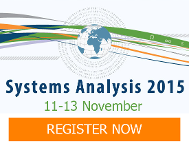06 November 2015
Journalist Tip Sheet: Systems Analysis 2015
Read on for selected highlights of potential interest to journalists, or check out the full conference program online. For more details, to register for the conference, or to arrange interviews with conference speakers, please contact Katherine Leitzell, IIASA Press Officer ().
Can't make it to Laxenburg? Watch our Live Stream starting at 9:00 CET on 11 November.
Oral presentations
Wednesday 11 November
I am not a modeller
Elizabeth Fulton, Commonwealth Scientific and Industrial Research Organisation (CSIRO), Australia
The biggest challenges for modeling are not complicated methodological challenges, argues Elizabeth Fulton, but rather, the mistaken notion that models and systems thinking are “beyond the average mind” or “too complex to be trustworthy.” Fulton explains how improved communication, education, and technological advances can help break down the barrier between modelers and the public.
Wednesday 11 November, 11:15-12:45: Session: Requirements for Methodological Advances in Systems Analysis
Abstract: link
The physics of human behavior
Yamir Moreno, University of Zaragoza, Spain
In Isaac Asimov’s famous science fiction series Foundation, “psychohistorians” plot the future of the human race with impeccable accuracy, millions of years into the future, based on the laws that govern human behavior. Physicist Yamir Morena explains how these laws differ from physical laws, yet he argues that with large datasets collective patterns begin to emerge. He will give examples of different scales, and explain the theoretical challenges and potential methods to address the challenges of social modeling.
Wednesday 11 November, 13:45-15:45: Session, Transdisciplinary Inspiration in Systems Thinking
Abstract: link
New measures for a new economy
Luciano Pietronero, University of Rome, Italy
As the global economic system grows increasingly complex, traditional economic measures no longer accurately represent the reality. In his talk, Pietronero will introduce new measures based on factors like the diversity of production in a country, and other qualitative variables, which the researchers have combined into new matrix for assessing economic fitness on a national level.
Wednesday 11 November, 13:45-15:45: Session, Transdisciplinary Inspiration in Systems Thinking
Abstract: link
Thursday 12 November
Tipping points in nature and society
Marten Scheffer, Wageningen University, The Netherlands
When a system reaches a tipping point, there is no turning back. Today, experts worry about tipping points in the climate system that could lead to collapse of the Antarctic Ice Sheet, for example, or tipping points in the financial market that could lead to global economic crises. Scheffer describes a whole new field of science devoted to understanding and predicting these critical thresholds.
Thursday 12 November, 09:00-11:00, Session: The Art and Craft of Systems Analysis (Part 2)
Abstract: link
The city as a system
Luis Bettancourt, Santa Fe Institute, USA
Cities can be understood and analyzed as complex systems, explains Bettancourt, bringing insight to future scenarios for sustainable development. In his presentation, he will explain how deeper scientific understanding of cities’ economies and societies enables modelers to produce more useful information, for planning the cities of the future.
Thursday 12 November, 14:15-15:45, Session: New Methods for Understanding Complex Systems (Part 1)
Abstract: link
Managing systemic risk
Stefan Thurner, IIASA and the Medical University of Vienna, Austria
The risk of a financial crisis is substantially higher than previously estimated, according to new research by Thurner and his team, which accounts for multiple levels of interconnectedness in the financial system. In his presentation, Thurner will explain a new scheme for taxation of risky financial behavior that would prevent such systemic collapses.
Thursday 12 November, 16:15-18:15, Session: New Methods for Understanding Complex Systems (Part 2)
Abstract: link
Friday 13 November
Modelling love dynamics
Sergio Rinaldi, IIASA, Austria and Politecnico di Milano, Italy
Rinaldi has spent the past decades on a quest to understand love—through mathematics. In his talk, he will explain how love affairs can be modeled based on basic principles of psychology. The model describes the potential evolutions of a love affair from an initial state of indifference to a full-blown relationship.
Friday 13 November, 09:00-10:30: Addressing Diversity in Social Systems (Part 1)
Abstract: link
Shame and climate change
Christopher Hauert, University of British Columbia, Canada
Is the solution to climate change as simple as pointing a finger? Probably not, says Hauert, based on the results of two behavior experiments focused on public goods questions. They showed that revealing the identities of people who contributed the most or the least resulted in a significant increase in cooperation. The problem of climate change is more difficult than this experiment, says Hauert, because the benefits of not contributing are immediate, whereas the rewards for successfully mitigating climate change are delayed by decades. In a study accounting for such delays, the researchers found that participants significantly discounted “future” rewards in favor of immediate benefits.
Friday 13 November, 11:00-12:00, Session: Addressing Diversity in Social Systems (Part 2)
Abstract: link
Modelling “wicked problems”
Robert Lempert, RAND Corporation, USA
So-called “wicked problems”—such as climate change—are difficult to address because they contain deep uncertainty, clashing values and opinions, and unpredictability. Lempert explains how new modeling methods can enable “robust” decisions that would succeed in a variety of scenarios.
Friday 13 November, 13:00-14:30, Session: Devising Integrated Solutions (Part 1)
Abstract: link
Focus on citizen science
Linda See, IIASA, Austria and Paul Chatterton, WWF
Citizen science and crowdsourcing are revolutionizing data collection in some of the most remote places on the planet. In this talk, See and Chatterton will describe several new projects, for example the Moabi project, which allows citizens to report illegal logging in the jungles of Congo, and Geo-Wiki, a tool for crowdsourcing data on the Earth’s land cover, to identify cropland, deforestation, and other key factors for land use change.
Friday 13 November, 15:00-16:30, Devising Integrated Solutions (Part 2)
Abstract: link
Poster presentations
In the conference poster session (18:30-20:30 on 11 November), approximately 100 international researchers will present new research on a broad variety of topics related to systems analysis. We invite journalists to join us in Laxenburg to learn more about this fascinating research and speak one-on-one with talented researchers from around the world.
Poster topics include:
- Climate change contributing to international migration
- Adaptation to increasing forest fire risk
- How do oil prices influence CO2 emissions?
- Climate-friendly transportation in Brazil
- Renewable energy in the Alps
- Future labor force participation in Europe
- And much more:
PUBLIC LECTURE: ROBBERT DIJKGRAAF
In a public lecture on 12 November, renowned physicist Robbert Dijkgraaf speaks about the paradox of modern science: While research digs into deeper layers of understanding, it creates more distance between the scientific community and the general public. More>>



